« January 2008 | HOME PAGE | March 2008 »
February 22, 2008
Pimp My Donkey Cart
In fact, let's forget about the donkey cart altogether and make it a Chrysler C300, just like Snoop Dogg drives! This is the first Uyghur music video I've posted in quite a long time:
For those of you keeping track, the performers in this video are Dilxat Rahidin and Tursun Dehhan and the song's title is "A Carter's Song".
UPDATE 2/23 It turns out that "A Carter's Song" is actually an updated Uyghur folk tune:
Thanks to YouTube user madinauyghurkizi for letting me know about this video.
posted February 22, 2008 at 09:05 PM unofficial Xinjiang time | Comments (59)
February 20, 2008
China's Soccer Shame
1.3 million people have watched the following YouTube clip in the past 48 hours, though I suspect that most of them have been angry South Koreans. There have also been more than 6,000 mostly racist comments. (Your momma was a Japanese whore, your grandma was raped by Mongolians, etc.)
The video shows the final minute and a half of last Saturday's women's soccer/football match between China and South Korea, a span of 90 unsportsmanlike seconds that is exceptional even in the long history of such dishonorable behavior:
I love those subdued but seething Koringlish subtitles. And what kind of bulls#%t is it that the Koreans lost their last-second free kick during a single-goal game due only to a Chinese dirty trick? I can tell you one thing... the North Koreans ain't gonna take any of that crap, ladies!
posted February 20, 2008 at 10:48 PM unofficial Xinjiang time | Comments (60)
February 18, 2008
The Annual Terrorism Smackdown
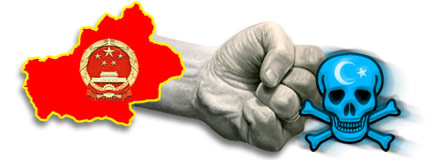
There aren't many details or any pictures at this point (don't hold your breath), but the official Chinese press and the international news wires are reporting a recent raid on a "terrorist gang" in Urumqi:
Chinese security forces raided an alleged terrorist hide-out in the far western region of Xinjiang, killing two men and arresting 15, an official newspaper reported Monday...
Guns, homemade bombs, training materials and "extremist religious ideological materials" were confiscated in the Jan. 27 raid in the vast region's capital of Urumqi...
The report said the suspects were members of a terrorist network that established a cell in Urumqi and planned to set off explosions and launch other "violent terrorist incidents" on Feb. 5, the last business day before the start of the Lunar New Year holiday.
No such incidents were reported on that date, the anniversary of 1997 riots in which hundreds of Uighurs protested against Chinese rule for two days.
Five policmen were reported injured in the raid by "homemade grenades".
For those of you who need a refresher course, it was last January that China shut down another supposedly ETIM-linked terrorist cell in Xinjiang. That event left 18 terrorists and one policeman dead, and like the more recent raid was only announced by Chinese authorities weeks after the fact. (Another similarity is that not even a single photo has been released documenting evidence of either battle.)
As last month's raid purportedly took place in a busy residential area, you'd expect some local busybody to have heard or seen something. And you'd be wrong. As Xinhua put it: "The incident didn't disrupt the atmosphere of the Spring Festival in Urumqi."
2 killed in China police raid on alleged terrorist hide-out, report says
By CHRISTOPHER BODEEN
Associated Press Reporter
18 February 2008
(c) 2008. The Associated Press. All Rights Reserved.
BEIJING (AP) - Chinese security forces raided an alleged terrorist hide-out in the far western region of Xinjiang, killing two men and arresting 15, an official newspaper reported Monday.
The report did not name the group involved. For years, authorities have been battling a low-intensity separatist movement among Xinjiang's Uighurs, a Turkic Muslim people culturally and ethnically distinct from China's Han majority.
Guns, homemade bombs, training materials and "extremist religious ideological materials" were confiscated in the Jan. 27 raid in the vast region's capital of Urumqi, reported the Global Times, a newspaper published by the Communist Party mouthpiece, the People's Daily.
The report said the suspects were members of a terrorist network that established a cell in Urumqi and planned to set off explosions and launch other "violent terrorist incidents" on Feb. 5, the last business day before the start of the Lunar New Year holiday.
No such incidents were reported on that date, the anniversary of 1997 riots in which hundreds of Uighurs protested against Chinese rule for two days.
People's Armed Police anti-terror forces surrounded the hide-out and demanded that those inside surrender, the report said. Fighting broke out when they refused and several police were injured, but none killed, according to the report.
A woman at the Urumqi city government's propaganda office confirmed the reported raid but said she had no details. She refused to give reporters her name, as is common among Chinese bureaucrats.
A man who answered the phone at the Xinjiang Public Security Bureau's publicity department referred questions to the Ministry of Public Security, where a spokesman asked for written questions to be submitted by fax.
Residents of the neighborhood where the raid reportedly took place said they had heard of it but had no direct knowledge of what happened.
China has ratcheted up anti-terror preparations ahead of the Beijing Summer Olympic Games in August. The nation's top police official last year labeled terrorism the biggest threat facing the event.
Terrorism experts say the threat is relatively low, however, given China's tight social controls. Still, they warn that Beijing's counterterrorism capabilities are weak, especially when it comes to groups based outside the country.
China says its main terror threat comes from an Uighur separatist group called the East Turkestan Islamic Movement, or ETIM, a group believed to have not more than a few dozen members. East Turkestan is another name for Xinjiang.
Chinese forces reported raiding an ETIM training camp last year and killing 18 militants allegedly linked to al-Qaida, and to Afghanistan's former rulers, the Taliban.
Chinese police kill two terrorists, arrest 15 others
Xinhua/chinadaily.com.cn
Updated: 2008-02-18 19:46
URUMQI - Chinese police shut down a terrorist gang last month in Urumqi, capital of northwest China's Xinjiang Uygur Autonomous Region, killing two persons and arresting 15 others, local sources said on Monday.
Five policemen were injured, none of them deadly, during the raid on January 27 when three homemade grenades were thrown toward them, the sources said.
The arrest was made in one of the major neighbourhoods in the city, according to www.huanqiu.com.
"The incident didn't disrupt the atmosphere of the Spring Festival in Urumqi," the website said.
posted February 18, 2008 at 11:09 PM unofficial Xinjiang time | Comments (61)
February 17, 2008
Take My Wife, Please!
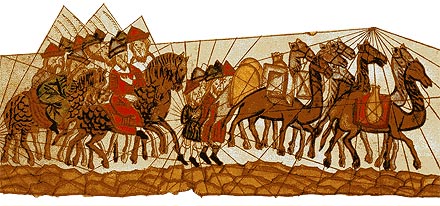
The itinerary of Marco Polo's well-documented journey to China is generally viewed with suspicion, but one thing is certain... the man talked a lot of trash about the natives he supposedly encountered along the way.
Although he was impressed with the jade and asbestos he discovered in Xinjiang, Marco had no love for the local population. After crossing the Pamirs, for instance, he observed that the inhabitants of Cascar (Kashgar/Kāshí/喀什) "are a wretched, niggardly set of people; they eat and drink in miserable fashion." But his finest derogatory remarks were saved for the unfortunate residents of Camul (Kumul/Hāmì/哈密):
And it is the truth that if a foreigner comes to the house of one of these people to lodge, the host is delighted, and desires his wife to put herself entirely at the guest's disposal, whilst he himself gets out of the way, and comes back no more until the stranger shall have taken his departure. The guest may stay and enjoy the wife's society as long as he lists, whilst the husband has no shame in the matter, but indeed considers it an honor. And all the men of this province are made wittols of by their wives in this way. The women themselves are fair and wanton.
Now it came to pass during the reign of MANGU KAAN, that as lord of this province he came to hear of this custom, and he sent forth an order commanding them under grievous penalties to do so no more (but to provide public hostelries for travelers). And when they heard this order they were much vexed thereat. (For about three years' space they carried it out. But then they found that their lands were no longer fruitful, and that many mishaps befell them.) So they collected together and prepared a grand present which they sent to their Lord, praying him graciously to let them retain the custom which they had inherited from their ancestors; for it was by reason of this usage that their gods bestowed upon them all the good things that they possessed, and without it they saw not how they could continue to exist. When the Prince had heard their petition his reply was, "Since ye must needs keep your shame, keep it then," and so he left them at liberty to maintain their naughty custom. And they always have kept it up, and do so still.
Oh, damn! Did he just call all of the fine women of Xinjiang whores and their husbands pimps? No you didn't, Marco Polo.
Of course, I myself haven't had a chance to confirm whether or not this commendable practice still exists in these parts, but believe me I'm on the case. In fact, I've traced this early predecessor of the "key party" all the way into the 20th century, where the trail suddenly goes cold. These swingin' Sinkiang headlines are from the Los Angeles Times, January 15, 1928:
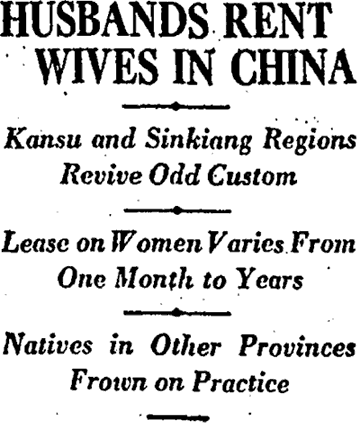
Va-va-voom! Do I have your attention now? You'll find the full article reproduced below... and I'll let you know if there are any developments in my, err, anthropological quest.
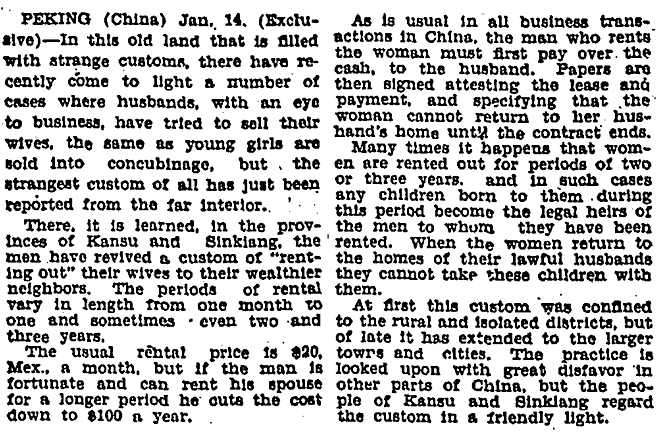
One question: why would a U.S. newspaper in the late 1920s use Mexican pesos as a standard currency for wife rentals? I know L.A. is close to the border and all, but... WTF?
posted February 17, 2008 at 12:41 AM unofficial Xinjiang time | Comments (67)
February 13, 2008
Beast Children
When I returned from Qinghai earlier this month, some of you probably felt that my characterization of Tibetan children as "absolute terrors" and "complete animals" was a bit harsh. Well, you were right. I should have limited my criticism only to the boys, as the following video clearly shows:
Pay careful attention to that cluster of boys in the second row on the right hand side. In less than one minute, they're caught pulling hair, biting fingers, hitting each other. And what's going on with those boys in the back left? It looks like they've got a gambling ring or a porno mag stashed back there. These kids don't even pay attention when one of their Tibetan teachers comes into the classroom 45 seconds into the video...
Am I crazy, or are these kids out of f#%@in' control!?
posted February 13, 2008 at 08:37 PM unofficial Xinjiang time | Comments (32)
February 11, 2008
What's Old is New
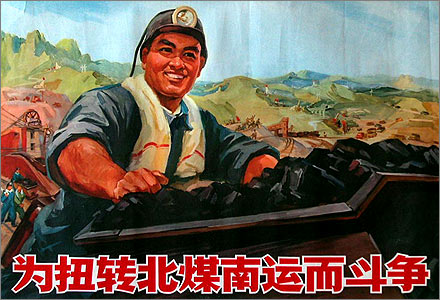
As China waged its "war on snow havoc" last week, The New York Times noted that the country's energy supply problems are exacerbated by geography:
The provinces of Guangdong, Guangxi, Guizhou, Hunan, Anhui and Jiangsu had the worst problems, with more than 30 million people affected by blackouts or brownouts, according to government estimates....
The bulk of China’s coal is mined in the western provinces of Shaanxi and Shanxi and the northwestern region of Inner Mongolia. But many coal customers are clustered in the industrialized southeastern and central coastal provinces, so coal must be hauled on China’s vast but overextended rail network.
More than 40 percent of rail capacity is devoted to moving coal, and the authorities have been investing heavily in new lines and cargo-handling facilities in an attempt to keep up with demand.
But, as you can see from the 1972 poster above, China has been trying to solve the problem of coal transportation for more than 35 years. The inscription along the bottom reads, "Strive to eliminate the need to transport coal from North to South."
Needless to say it's something easier said than done, and it's very low on the list of top priorities at the moment. In fact, Chinese officials responded to the impending doom in the week leading up to the New Year by suspending coal exports, loading up 125 ships with 4.5 million tons of the stuff, and sending it down to Guangzhou (in the south) from Bohai (in the north). Strive on, comrades.
posted February 11, 2008 at 12:07 PM unofficial Xinjiang time | Comments (31)
Happy Birthday, Pinyin.
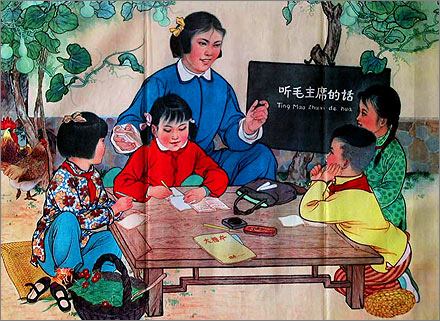
Although it often confounds first-time visitors to China with it's non-conformation to any Western rules of pronunciation, I'm a firm believer that hanyu pinyin is a good thing. Have you ever tried to read any of that old Wade-Giles, Yale, or Postal Map romanization crap? Impossible. Of course, I've heard old-timers and hardcore Taiwan splittists argue for the old systems of rendering Chinese into the Latin alphabet, but they're undeniably a dying breed.
From Xinhua:
Hanyu Pinyin, or the Chinese phonetic system, will celebrate its 50th anniversary on Monday (Feb. 11). One billion Chinese have used it to learn mandarin since the first edition of pinyin was issued in 1958.
"Pinyin is useful. It helps us to learn Chinese characters. Thanks to pinyin, we learnt how to read," 92-year-old Chen Douxiang from Wanrong County, northern Shanxi Province, still remembered the pinyin poem she learned 50 years ago.
The first edition of Pinyin was adopted at the Fifth Session of the First National People's Congress on Feb. 11, 1958. It was then introduced to primary schools, and used to improve the literacy rate among adults.
So, here's to another fifty years of mo rhyming with guo! Thanks to Maopost.com for the 1965 propaganda poster above. Without pinyin, how would those kids possibly learn to obey the words of Chairman Mao!?!
posted February 11, 2008 at 09:41 AM unofficial Xinjiang time | Comments (28)
February 08, 2008
Ni Hao, Kai-Lan!
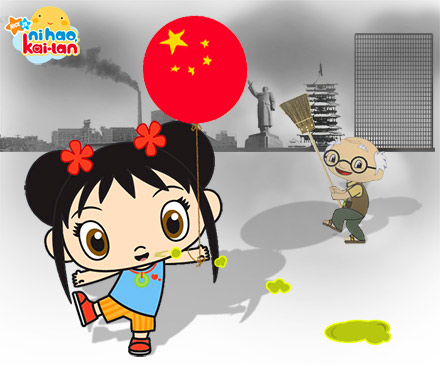
Have you heard about Ni Hao, Kai-Lan? It's a new cartoon from Nickelodeon aimed at the preschool and kindergarten set. Evidently, "Kai-lan Chow is an exuberant Chinese-American preschooler, almost 6, who wants you to come play with her and her best friends." Oh, and she's hell bent on teaching your kids Mandarin Chinese and, wait for it... Chinese values.
Uh oh.
So what exactly are these so-called Chinese "habits of the heart"? From the show's website:
Mind-body connection Typically, television portrays excitement as the good emotion to feel. In many Chinese-American communities, the good thing to feel is often calmness and contentment. Feeling excited and feeling calm can both be happy feelings, but they differ in how aroused the body is.
Perspective-taking In many Chinese and other East Asian families, children are encouraged to take the perspective of others to maintain harmony in relationships with other people.
Being a good member of the group Ni Hao, Kai-lan also emphasizes the Chinese and Chinese American value of being a good member of a group.
OK, it's already creepy enough that this little girl is constantly followed around by a grandfather (YeYe) who provides her with "gentle guidance", but why did the producers need to go and talk about the "happy feelings" caused by different levels of arousal in Kai-lan's not quite 6-year old body? You people are sick!
As I've already exhausted all my creative energy on this topic spending way too much time on the amusing graphic above, my challenge to you — the humble reader — is this:
Which Chinese "habits of the heart" should Kai-lan really be teaching to America's youngest generation?
posted February 08, 2008 at 12:23 PM unofficial Xinjiang time | Comments (62)
The Monkey & The Monk
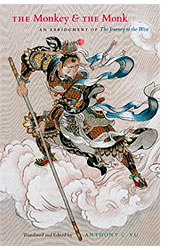 I've been memed (the blogger version of a chain letter) by the good folks over at Registan, and in my infinite boredom related to the Chinese New Year slowdown I've decided to respond. So, let's see... what are the rules here?
I've been memed (the blogger version of a chain letter) by the good folks over at Registan, and in my infinite boredom related to the Chinese New Year slowdown I've decided to respond. So, let's see... what are the rules here?
Pick up the book closest to you when you receive this meme. Flip to page 123. Identify the first five full sentences on that page. Then post the three sentences coming directly after that sentence. (That's the 6th, 7th, and 8th sentence for us laymen.)
The book lying next to my bed this morning happened to be The Monkey & The Monk, an abridged translation of Journey to the West written by Anthony C. Yu. I received it as a Christmas gift this year. And now for the three sentences you've all been waiting for:
"Having bitten the sow to death and killed the rest of the litter, I took over this mountain ranch and passed my days eating people. Little did I expect to run into the Bodhisattva. Save me, I implore you!"
You gotta love Zhu Bajie, everyone's favorite idiotic rake-wielding pig-faced reformed cannibal!
Now I must tag five other unfortunate souls to participate in the meme. And the winners are... "Barbershop" Ben Ross of Fuzhou fame, Dave over at the ever-enjoyable yet inaccessible Mutant Palm, Vincent — a fellow Xinjiang blogger — from Outback of the Orient, John over at Sinosplice (did you know that he's lived in China for 7.534 years?)... and, taking it outside the China blogosphere, Elana of the fantastic Iraqistan.
If you've never checked out Iraqistan, don't waste another moment. I've known Elana since middle school, and she's been blogging (somewhat anonymously) from her tours of duty in Iraq and Afghanistan for a few years now. Very funny — and sometimes very sad — stuff about life in uniform.
posted February 08, 2008 at 10:19 AM unofficial Xinjiang time | Comments (39)
February 06, 2008
The Pickle King of Islamistan
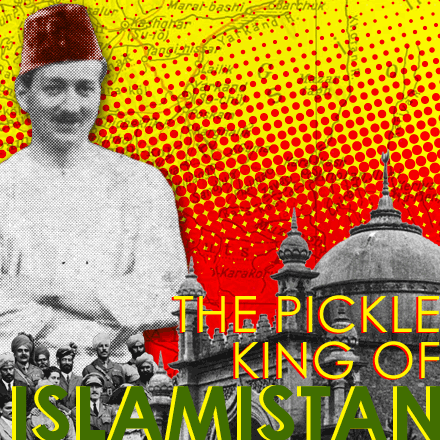
NOTE: Since it's been about three months since I first promised to write a post about the man who would be king of Xinjiang, I recommend that all of you re-read "Glory Days for Separatists" before continuing on.
Who exactly was Dr. Khalid Sheldrake, the so-called (by me) "Pickle King of Islamistan"? Well, for starters he was born as Bertram William Sheldrake in 1888, a middle-to-upper class fellow who in the first decade of the 20th century became one of Britain's earliest white Muslim converts. The son of a wealthy pickle magnate, Sheldrake changed his name to Khalid upon his conversion to Islam and became very active in the early days of the Woking Muslim Mission, Britain's first mosque. He was a frequent contributor to The Islamic Review and later went on to found the Western Islamic Association.
Khalid Sheldrake was nothing if not a zealous believer in Islam, spending much of his time analyzing the supposedly mistaken lessons contained in the Bible and comparing them unfavorably with the teachings of the Koran. Among his fellow British Muslims, Sheldrake quickly gained a reputation for being "a little too ambitious" (link) and lacking substantially in humility. Alienated from his Muslim brothers but well-regarded by the members of his race, Sheldrake easily captured the 1927 award for Self-Righteous Muslim Dork of the Year in conjunction with his efforts to translate the Koran into Esperanto. (Seriously, this wacko was the world's top authority in the under-appreciated field of Islamic-Esperanto Studies.) In 1930, Sheldrake was instrumental in quelling anti-Muslim riots in the British port of South Shields stirred up by rumors that Arab seamen were luring white girls into sexual liasons with money and gifts.
Ah, yes... to cap it all off (pun intended), Dr. Sheldrake — who's titles sometimes extended to Sheikh, Imam, and Count — became quite fond of wearing a dark red fez in the Moroccan style. This striking piece of head gear became something of a personal trademark.
And now on to the Xinjiang connection: Long since having established his reputation as a complete weirdo and occasional jack-ass, in 1934 Dr. Khalid Sheldrake somehow came to the attention of the Uyghur government of the short-lived Khotan Emirate established alongside - but separate from - the equally brief East Turkestan Republic. There are some unverified suggestions that Sheldrake was an agent for the British foreign intelligence service, and that his appointment was arranged in an attempt to extend British influence in Xinjiang and Tibet.
The New York Times first reported on Dr. Sheldrake's royal intentions on March 13, 1934:
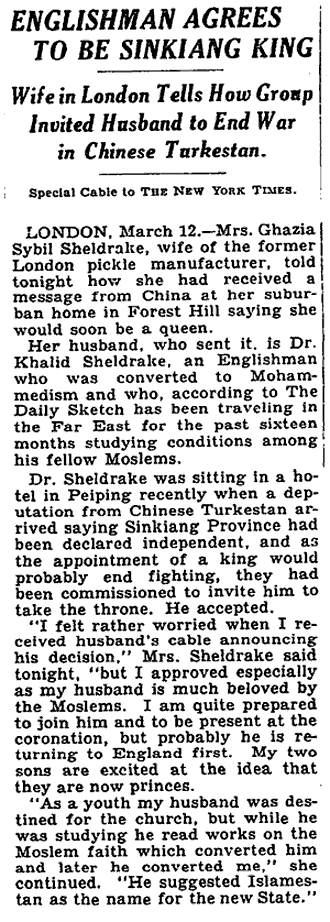
Notice the huge grain of salt that the Times' writer seems to be taking with this story... no discussions of the geopolitical importance of Xinjiang or of the recent rebellions that had devastated the local population. Just the musings of a haughty British housewife, excited about the admiration held for her husband by Muslims worldwide and a bit worried about her two little princes. (These two princes would later go on to fame as the subject of a Spin Doctors hit single.)
Not to be outdone in commenting on the humorously unlikely chances of an Englishman's success ruling over a land of "half-savage Mohammedan tribesman", the Washington Post chimed in on June 10, 1934 (edited for length and humor):
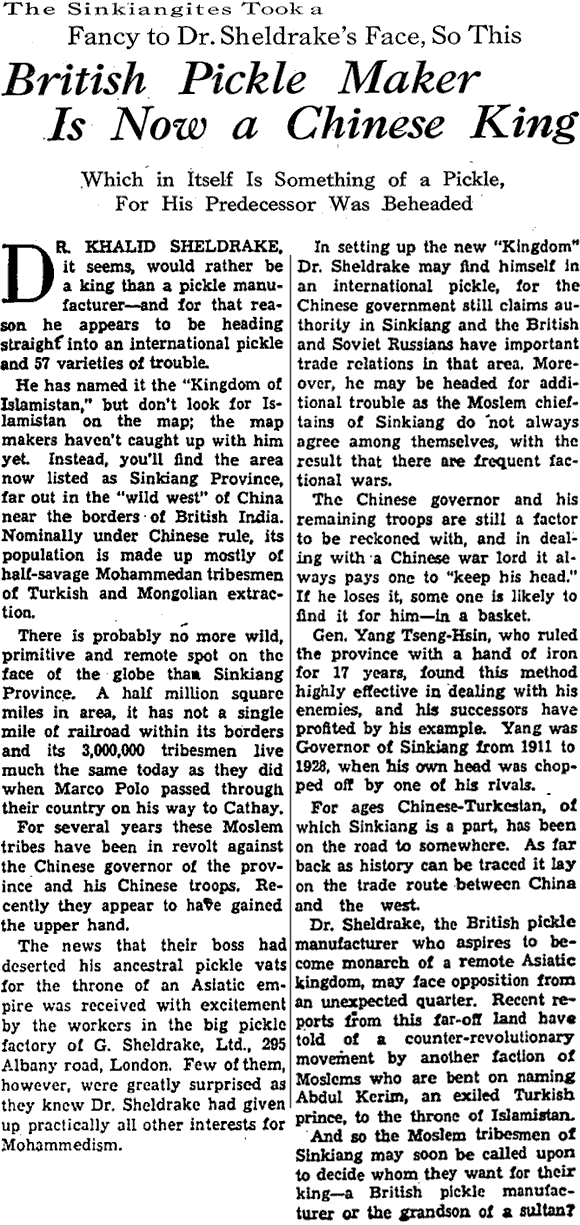
Gulp! I'll take one sultan's grandson, please.
It must have been a real pickle of 57 varieties for that Washington Post write to work the word "pickle" into that article so many times. Good work, old boy!
Of course, as you've probably already guessed, the story of Dr. Khalid Sheldrake doesn't quite turn out the way he expected it to... thus, I'm writing this entry not from Islamistan where everyone wears a dark red fez but from a land that remains Chinese and is still called Xinjiang, the "New Frontier". (Need more evidence? Open the window. Those fireworks aren't celebrating the Islamistani New Year, are they?)
Dr. Khalid Sheldrake's brief rise to power in Xinjiang concludes, then, with a flight of terror somehow perfectly suitable for a power-hungry toothbrush-mustachioed British ninny. Barely settled on his throne in Hotan (Or was it Kashgar? He's sometimes referred to as the Emir of Kashgar. Hmmmm.), Sheldrake is forced to flee towards British India. From the Los Angeles Times, August 5, 1934:
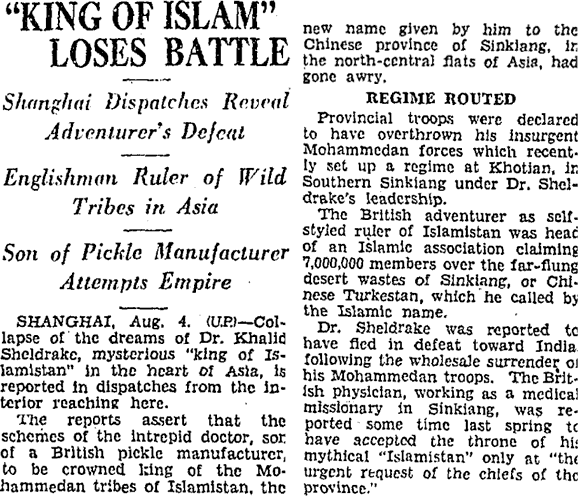
And guess who it was who chased old Sheldie off his mutton-scented throne? None other than Sheng Shicai, an early convert to communism who later proved his total un-Communistness by executing Chairman Mao's little brother and fleeing to Taiwan. Or, in some accounts, Sheldrake was chased off by Ma Zhongyin (aka the Baby General), who was then in turn chased into the USSR by Sheng Shicai... where he was never heard from again. It doesn't really matter either way, does it?
Anyway, that's the history of Xinjiang in a nutshell... pompous asshole becomes king and is chased off by an even bigger jerk. Fighting ensues. People die. And then it happens all over again. And again. And again...
As TIME magazine put it, the story of Dr. Khalid Sheldrake is "no more outlandish than everything else in the mountain-walled bowl of sand between China, Russia and India." Well, perhaps a bit more outlandish.
Happy Year of the Rat to everyone in China, the U.S., and across the globe! 新年快乐!
posted February 06, 2008 at 03:06 PM unofficial Xinjiang time | Comments (95)
February 04, 2008
Life is Good.

Who's laughing now? Greatest. Super Bowl. EVER! (more)
posted February 04, 2008 at 07:59 AM unofficial Xinjiang time | Comments (38)
